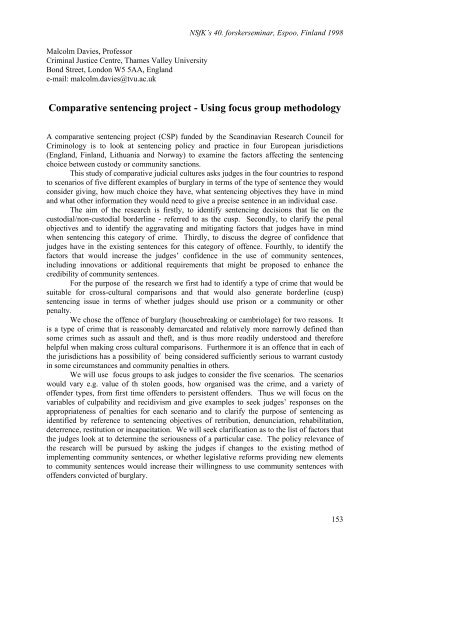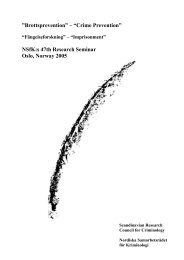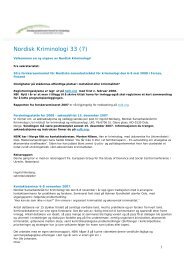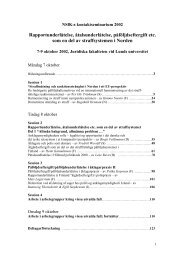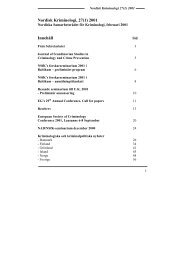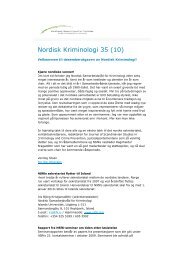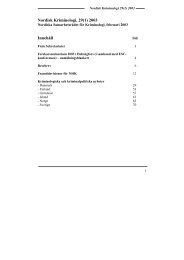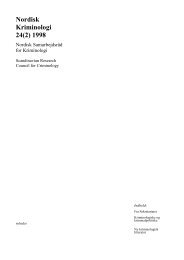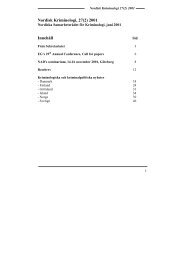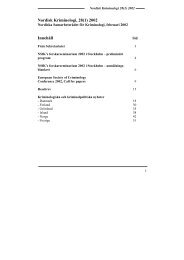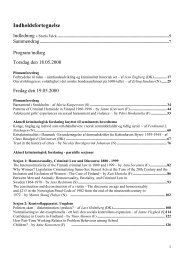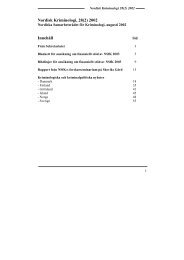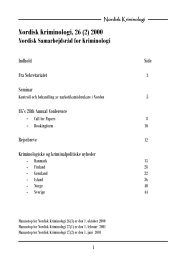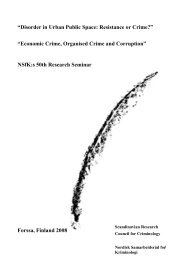Organised Crime & Crime Prevention - what works? - Scandinavian ...
Organised Crime & Crime Prevention - what works? - Scandinavian ...
Organised Crime & Crime Prevention - what works? - Scandinavian ...
Create successful ePaper yourself
Turn your PDF publications into a flip-book with our unique Google optimized e-Paper software.
Malcolm Davies, Professor<br />
Criminal Justice Centre, Thames Valley University<br />
Bond Street, London W5 5AA, England<br />
e-mail: malcolm.davies@tvu.ac.uk<br />
NSfK’s 40. forskerseminar, Espoo, Finland 1998<br />
Comparative sentencing project - Using focus group methodology<br />
A comparative sentencing project (CSP) funded by the <strong>Scandinavian</strong> Research Council for<br />
Criminology is to look at sentencing policy and practice in four European jurisdictions<br />
(England, Finland, Lithuania and Norway) to examine the factors affecting the sentencing<br />
choice between custody or community sanctions.<br />
This study of comparative judicial cultures asks judges in the four countries to respond<br />
to scenarios of five different examples of burglary in terms of the type of sentence they would<br />
consider giving, how much choice they have, <strong>what</strong> sentencing objectives they have in mind<br />
and <strong>what</strong> other information they would need to give a precise sentence in an individual case.<br />
The aim of the research is firstly, to identify sentencing decisions that lie on the<br />
custodial/non-custodial borderline - referred to as the cusp. Secondly, to clarify the penal<br />
objectives and to identify the aggravating and mitigating factors that judges have in mind<br />
when sentencing this category of crime. Thirdly, to discuss the degree of confidence that<br />
judges have in the existing sentences for this category of offence. Fourthly, to identify the<br />
factors that would increase the judges’ confidence in the use of community sentences,<br />
including innovations or additional requirements that might be proposed to enhance the<br />
credibility of community sentences.<br />
For the purpose of the research we first had to identify a type of crime that would be<br />
suitable for cross-cultural comparisons and that would also generate borderline (cusp)<br />
sentencing issue in terms of whether judges should use prison or a community or other<br />
penalty.<br />
We chose the offence of burglary (housebreaking or cambriolage) for two reasons. It<br />
is a type of crime that is reasonably demarcated and relatively more narrowly defined than<br />
some crimes such as assault and theft, and is thus more readily understood and therefore<br />
helpful when making cross cultural comparisons. Furthermore it is an offence that in each of<br />
the jurisdictions has a possibility of being considered sufficiently serious to warrant custody<br />
in some circumstances and community penalties in others.<br />
We will use focus groups to ask judges to consider the five scenarios. The scenarios<br />
would vary e.g. value of th stolen goods, how organised was the crime, and a variety of<br />
offender types, from first time offenders to persistent offenders. Thus we will focus on the<br />
variables of culpability and recidivism and give examples to seek judges’ responses on the<br />
appropriateness of penalties for each scenario and to clarify the purpose of sentencing as<br />
identified by reference to sentencing objectives of retribution, denunciation, rehabilitation,<br />
deterrence, restitution or incapacitation. We will seek clarification as to the list of factors that<br />
the judges look at to determine the seriousness of a particular case. The policy relevance of<br />
the research will be pursued by asking the judges if changes to the existing method of<br />
implementing community sentences, or whether legislative reforms providing new elements<br />
to community sentences would increase their willingness to use community sentences with<br />
offenders convicted of burglary.<br />
153


